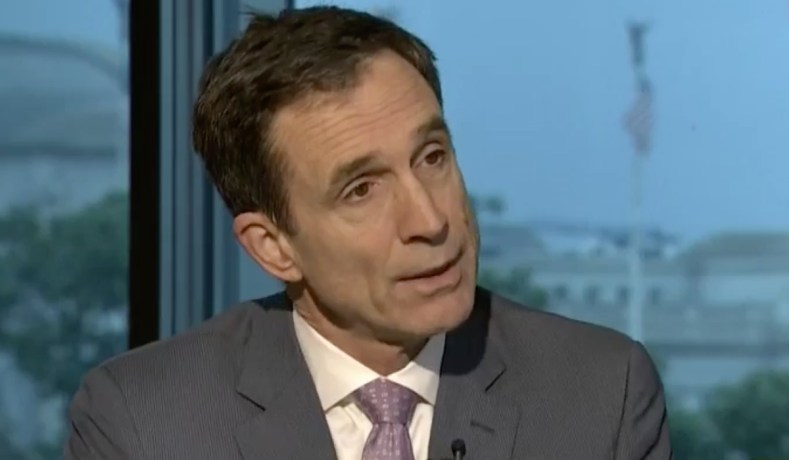Traditional American conservatism has always stood for the protection of our shared liberal freedoms: freedom of speech, freedom of worship, the right to bear arms, etc. Conservatives too have traditionally defended a liberal, market-oriented economic view that sees the individual as most capable of making a rational decision for themselves in their own situation, lending to a general posture of despising government intervention in these and other realms.
Recently, however, as many have started to ascribe the West’s recent failures and crises to the liberal paradigm, strands of illiberal thought have emerged within conservatism which place doubt on many traditional American conservative assumptions and goals. As commentators and political theorists have debated the merits of which path provides the best way forward, conservatism has splintered into increasingly embittered factions.
Stepping into this fierce war of words, Russell Reno, editor of First Things, delivered Thomas Aquinas College’s 2022 Presidents’ Day Lecture, where he attempted to carve out his own path towards understanding a reconciliation of liberal and illiberal thought on the right.
To explain liberalism, Reno turned to Saint Augustine, who, he notes, “says a mass of individuals becomes a public…when they are united by shared loves.” The liberal order, under this framework, “proposes a shared love of freedom as a foundation of our common life.”
What are the implications of this shared love? “We are capable of self-command…and it is ignoble to live in a way that overrides or stunts this capacity for self-command.” Such inclinations, he suggested, “take two general forms. One aims to remove barriers, and the other seeks empowerment.”
“The first form,” he said, “rests on the principle of noninterference, which dictates removing traditional forms of control over personal decisions, especially control that relies upon the power of the state.” The tenet of empowerment, meanwhile, is a key component of “modern projects of liberation,” which emphasizes positive rather than negative liberties.
“Control reduction and empowerment have always been intertwined in the history of liberalism,” Reno stated. He noted that this “double movement” of barrier reduction and empowerment are intrinsic and evident to the social movements which have characterized liberalism’s history. In particular, Reno sees both elements as critical pieces of the modern transgenderism movement.
This example highlights the larger problem of liberalism. “If we are to have a truly liberal society, one united in a shared love of freedom, then surely we must devote ourselves to the great labor of” eliminating “the social and moral norms that prevail. And to this effort, we must add an equally urgent and pervasive therapy of affirmation so that those socialized in accord with the old norms are empowered to craft and embrace their own identities.”
The bottom line? “If we make a shared love of freedom our sole goal, we will get something like present-day cultural progressivism and its totalitarian tendencies,” Reno assured his audience. Thus, paradoxically, prioritizing freedom above all other ends leaves a society with less freedom.
Due to this inevitability, Reno proclaimed that “liberalism…cannot endure without something of the illiberal truth of integralism.” What is integralism, according to Reno? If liberalism amounts to a society built upon a singular love of freedom, then integralism is “a vision of society organized by a shared love of a range of goods,” in which “our souls are roused to higher ends than self-interest or self-actualization.”
While such a definition of integralism may prove to be controversial, Reno nevertheless identifies himself as a “liberal conservative,” saying this implies advocating “caution in the degree of power backed up by state sanction,” as well as “tolerance of the inevitable plurality of goods promoted in a society.”
“But,” he concluded, “I am certain that a genuinely liberal society, one that is capable of sustaining a culture of freedom, requires those goods. And it requires the authorities to form us to love them.”
“As a people, Americans rightly love freedom. But to vindicate that love, we must share other loves, and order our society to promote and protect the objects of those loves. If we are to taste the sweetness of freedom, we need the salt of what today’s liberals foolishly deride as illiberalism.”
One cannot reasonably doubt that the freedoms enjoyed by liberal societies are built upon the moral and social capital of illiberal antecedents. Still, the question remains, how did this capital diminish, and by what means can we anticipate restoring it?
While Americans and other liberal proponents may hope to revive a unified love of diverse yet righteous goods via nonintrusive means, they must still meet the challenge of the age of determining how unity may be reliably achieved in a society marked by voluntarism, whether through liberal or illiberal methods. But meet this challenge they must: the future of freedom itself may depend on it.






Comment by GEORGE on April 1, 2022 at 8:33 pm
It’s not liberalism that plagues us. It is LEFTISM which is quite the opposite! There is no liberality, no tolerance on the Left. They only USE such terms as a cloak. They speak of ‘inclusiveness” but only include their own while giving lip service to various buzz words and terms. They consistently call evil good and vice versa but dress it up in deceptive language to get what they want.